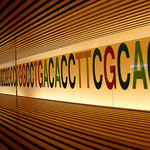Right: Image of Marchantia
The OpenPlant initiative is a BBSRC-EPSRC funded synthetic biology centre, based at the University of Cambridge, the John Innes Centre and The Sainsbury Laboratory in Norwich, that aims to address these foundational requirements and then apply them to engineer traits including plant metabolic pathways and natural product synthesis routes. Applications include input to major programmes addressing grand challenges for energy and food security. For example, carbohydrate engineering for improved yield of biofuels or studying Marchantia to inform a synthetic approach to nitrogen-fixing in cereals, where it could have major implications for fertilizer use. Metabolic diversity in plants supplies us with important drugs, flavorings and agrochemicals in addition to impacting plant ecology and protection, so another OpenPlant project concerns optimizing enzymes and engineering gene clusters to synthesize these compounds.
OpenPlant aims to shape working practices and norms in these early stages of plant synthetic biology, by promoting interdisciplinary exchange, the development of standards and responsible innovation. It promotes an ecosystem of open technologies giving researchers and small companies greater freedom to operate within a two-tier IP system. IP-free circulation of foundational tools and DNA parts should accelerate uptake, innovation and entrepreneurship; allowing exploration of new models for decentralized ownership, control and manufacture of synthetic plant technologies. Protecting inventions representing novel combinations and applications of these low-level components preserves investment and retains commercial prospects, while also promoting alternative business models.
Innovation in plant biotechnology, particularly in high-value areas such as crops, is increasingly constrained by intellectual property (IP) protection, sometimes restricting access to genetic tools. This can impede the ability of innovative synthetic biology programmes to succeed. Commercial entities from entrepreneurial startups to large multinationals already struggle through patent thickets when bringing products to market and both academic-industrial exchange and sharing among researchers is restricted by terms and conditions in materials transfer agreements. OpenPlant experiments with openness as a means to aid innovation, particularly as the scale of DNA systems increases and the number of parts and tools involved in creating an engineered organism grows. Openness also offers greater access to research tools for the development of synthetic plant products that have implications for global sustainability and international development, and that may rely on decentralized projects to address local needs.
These efforts are part of a broader ongoing exploration of open practices and commons-based knowledge production among many communities. Open source strategies have proved fruitful in software and computing, from multimillion dollar commercial companies such as RedHat built on the basis of openly distributed code, through to projects such as the Raspberry Pi and its associated open software interfaces, which are wildly popular among educators and makers, including scientists. CERN, a scientific organisation with a strong history of successful technology transfer, heavily promotes open source hardware projects. Their repository hosts over 100 projects, with 16 companies actively engaged in testing or producing hardware based on technologies developed at CERN.
Open research practices have been promoted at the grassroots of several academic communities and are fast becoming a focus of funding agencies hoping to leverage their potential for accelerating research and innovation and reducing inequities in access to knowledge. One project employing an approach analogous to OpenPlant is the Structural Genomics Consortium, a public-private partnership for drug discovery that restricts IP protection of any results until the later stages of clinical trials, thus moving the pre-competitive boundary later in the discovery pipeline. As per a recent evaluation report, its open access approach is considered a significant incentive for investment by commercial partners owing to better facilitation of downstream research and increased competitiveness further down the value chain. The benefits of sharing were felt by the companies involved to outweigh any risks and associated with late-stage IP protection. Other projects such as Open Source Malaria have also described how open approaches accelerated their research, including via industrial partnerships.
In summary, OpenPlant is performing cutting edge synthetic biology research while also exploring the potential of open technologies by engaging with diverse partners, building communities and providing incentives for open projects, such as seed funding. We will document and share what we learn from our approach to promoting innovation and entrepreneurship alongside the technologies and scientific results arising from our research. We welcome feedback from the SynBioBeta community!
 New Phytologist have published a report on the OpenPlant ERASynBio Summer School in plant synthetic biology authored by Nicola Patron, Colette Matthewman and collaborators at BBSRC.
New Phytologist have published a report on the OpenPlant ERASynBio Summer School in plant synthetic biology authored by Nicola Patron, Colette Matthewman and collaborators at BBSRC.
![[Closes 24 Nov 2107] Apply now to the OpenPlant Fund!](https://images.squarespace-cdn.com/content/v1/54a6bdb7e4b08424e69c93a1/1509564315902-TUO4I6QRWI9TT8UGSIAJ/OpenPlantTwitter_400x400+%281%29.jpg)

![[Closes 7 Mar 2017] OpenPlant Research Associate (Haseloff Lab)](https://images.squarespace-cdn.com/content/v1/54a6bdb7e4b08424e69c93a1/1486552818859-FH76MCA8SMFU93WB85RX/OpenPlantTwitter_400x400.jpg)




 Professor Jonathan Jones
Professor Jonathan Jones